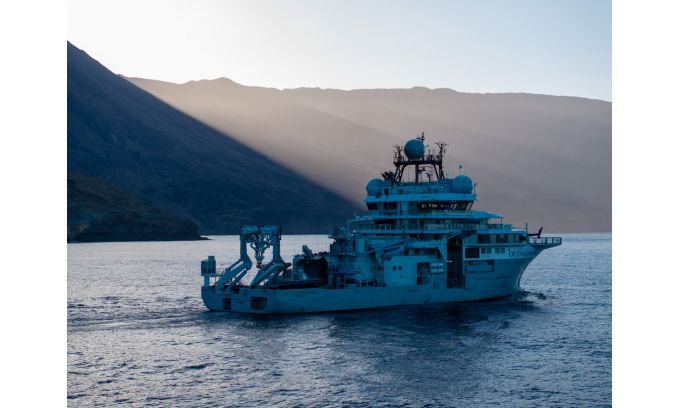A wave of hands-on discovery and scientific storytelling marked the participation of King Abdullah University of Science and Technology (KAUST) students in OceanQuest’s inaugural “Around Africa Expedition.”
Launched in January 2025, this deep-sea voyage represents a major step in expanding KAUST’s engagement in ocean research. Strengthened through its partnership with OceanQuest, the expedition aimed to amplify training, exploration, and global visibility in marine science. Aboard the state-of-the-art research vessel RV OceanXplorer, early-career scientists from around the world – with strong African representation – combined research, practical training, and science communication. The initiative reflects a shared commitment to next-generation talent development and advancing ocean science in line with Saudi Vision 2030.
Starting in Moroni, Comoros, the first leg of the expedition explored the Indian Ocean down to Cape Town, South Africa, with a focus on biodiversity assessments across multiple seamounts. The second leg continued northward to Walvis Bay, Namibia, and then to Mindelo, Cabo Verde, where the final phase of scientific work was carried out. From there, the vessel sailed onward with a new group of early-career ocean professionals (ECOPs) to Las Palmas, Canary Islands, before concluding in Nice, France, for the United Nations Ocean Conference in June.
Deep-ocean mapping techniques
Three KAUST PhD candidates joined this transformative journey. Murtadha Al Malallah, a PhD candidate in Earth Science and Engineering working under professor Froukje van der Zwan, joined the first leg as a geologist. He learned deep-ocean mapping techniques and collected volcanic rock samples to investigate the origins of seamount formations in the southwestern Indian Ocean. “By learning about how seamounts form there, we can also learn about the seamounts in Saudi Arabia.”
Participating in the second leg were Ali Alabyadh and Ahmed Alsaggaf, both PhD candidates in the Marine Microbiomes Lab led by KAUST professor Raquel Peixoto. “It was an inspiring experience to live, work and collaborate with my colleagues from all around Africa,” said Alabyadh. “We learned a lot together and from each other, and we were exposed to different disciplines of ocean science.”
Alsaggaf described his three weeks on board as a period of biological exploration, deep-sea organism identification, water sampling for genetic sequencing, and measuring carbon chemistry to assess ocean acidification. Originally planned to disembark earlier, both students were invited to stay on for the Cabo Verde science mission when additional berths became available. “As a marine scientist working on coral preservation and restoration, I was able to see how different corals can survive through global stressors and build reefs and communities underwater,” Alsaggaf added. “I also experienced active field research in new ways I was not exposed to before – experiences that I would like to translate back to my PhD for sure.”
Public engagement
A primary component of the expedition was media training, offering participants practical experience in science communication, content creation, and public engagement at sea. According to Dr Nico Augustin, deep-sea research often lags in public visibility despite its critical importance. The “Around Africa Expedition” aimed to empower young scientists to share discoveries and raise awareness through impactful outreach.
For Alsaggaf and Al Malallah, the voyage highlighted the power of visual storytelling to make science accessible and connect with wider audiences. Alabyadh said the photography and videography skills he gained while working on six short films significantly expanded his approach to science communication. “I came back to KAUST with so much enthusiasm and creative ideas for sharing my stories and scientific work with the wider community for ocean advocacy.”
Dr Augustin described the expedition overall as an “internship at sea,” providing hands-on training with marine equipment and real-world experience essential for building confidence and strengthening academic and career profiles.
OceanQuest, a Saudi nonprofit based at KAUST, was recently launched to advance deep-ocean discovery, innovation, and global collaboration in support of Vision 2030. This first expedition officially concluded with the vessel’s arrival in Nice, France, for the UN Ocean Conference in June, highlighting Saudi Arabia’s growing role in international ocean science. The experience left the students inspired to share their discoveries and advocate for ocean science within their communities, signaling the start of even more ambitious missions ahead.







